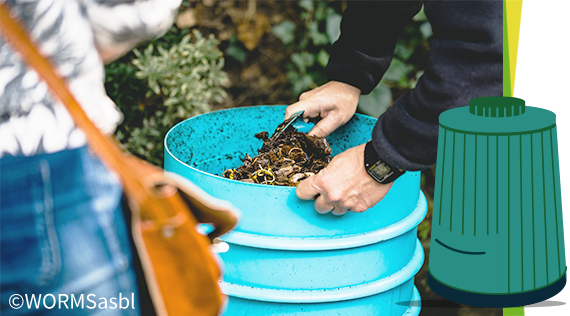
Individual composting
In your garden, kitchen, garage or on your balcony: composting at home is easy and practical. It only takes a few months to produce free fertiliser that is 100% natural. Want to get started?


In your garden, kitchen, garage or on your balcony: composting at home is easy and practical. It only takes a few months to produce free fertiliser that is 100% natural. Want to get started?

The first step is the most important one. Do you need a bin? A wooden composter? Or a wormery? In fact, it all depends on where you live, the size of your garden and the type of waste you want to turn into compost. In small gardens, a bin is ideal. Its capacity will depend on the quantity of waste to be processed. Wormeries, on the other hand, are intended for indoor composting because they do not take up much space. If they are well looked after, they are very efficient and do not smell at all.
To make the right choice, check our guide to different composting techniques.
Do it yourself: it is easy to make all these different composting tools yourself with recycled materials. There are plenty of tutorials online!
A good balance of materials, aeration, moisture… good compost needs a bit of TLC (tender loving care). To find out all about the golden rules for great compost and to get it right from the start, head over to the Brussels Environment website or follow one of the training courses offered by the Region!
Compost Guides are volunteer citizens who share their knowledge and experience with new composters free of charge. There are more than 200 of them in the Brussels Capital Region, so you are bound to find one nearby.
The Region also offers a helpdesk service for all your composting questions:
infocompost@environnement.brussels
Plus a wide range of other support for composting, available on the service facilitator page.

